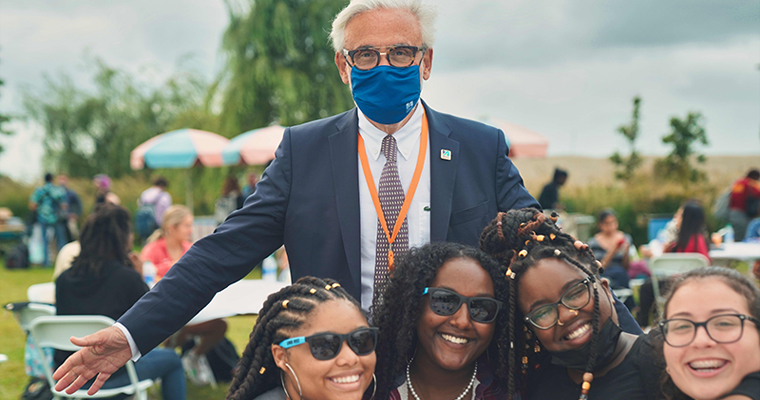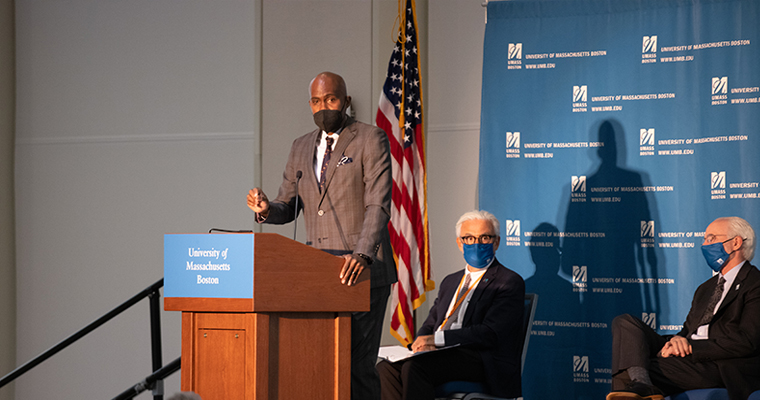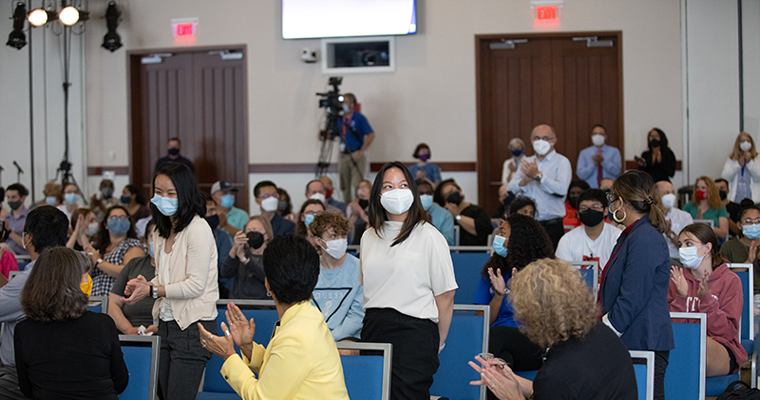Chancellor Suárez-Orozco celebrates return to campus, renewed focus on mission in Convocation address
"We stand as a national leader in educating a diverse student body."
The UMass Boston community came together in the Campus Center Wednesday for Convocation and a barbeque, officially marking the beginning of a new academic year and a return to campus after a year and a half of remote learning.
Chancellor Marcelo Suárez-Orozco shared his vision for the university in his first in-person convocation address. He explained why UMass Boston is more important today than ever before, emphasizing the university’s mission to provide exemplary higher education to students who may not have access otherwise.
Over the past six years, the percentage of undergraduate students of color has risen 10 points, to 62 percent in fall 2020.
“We stand as a national leader in educating a diverse student body,” he said. “We must continue to serve and lead the way in this area through a comprehensive ethic of care and a renewed commitment to diversity, equity, and inclusion. We shall continue to chart the course in our never-ending quest to become an exemplary anti-racist, health promoting urban public university.”

Suárez-Orozco pointed to two important initiatives that he says will shape the university for years to come.
UMass Boston recently received a $15 million gift from UMass Board of Trustees Chairman Robert Manning and his wife, Donna, which will support the newly renamed Robert and Donna Manning College of Nursing and Health Sciences. The record-setting gift will further enhance academic excellence and the college’s ongoing mission to diversify the nursing and health sciences field so that the next generation of caregivers will have the scientific and humanistic tools to carry on their work. U.S. News and World Report recently ranked UMass Boston’s undergraduate nursing program 43rd in the nation.
Suárez-Orozco also launched a university-wide strategic planning process last week. During this coming academic year, campus leaders will endeavor to set a course for UMass Boston for the years ahead.
“We invite all our communities, faculty, students and staff to think big and think realistically as we set a course of work with concrete, actionable, and measurable goals to hold ourselves accountable in turning our dreams and ideals into a reality,” he said.
Suárez-Orozco also referenced an op-ed he wrote with UMass President Marty Meehan in the Boston Globe, declaring that America finds itself at a moment in history that demands clear, honest, knowledge-based responses to existential threats ranging from climate change to manipulated elections to pandemics. And too often, society’s leaders are not only ignoring these threats but elevating dishonest, artful pandering over difficult but honest decision-making.
He said institutions like UMass Boston are uniquely equipped to “reverse the truth’s insidious slide toward a slow death.”
“Universities should elevate truth-seeking, truth-finding, and truth-telling to a sense of existential urgency,” he said, calling for increasing access to higher education. “Expand experiential learning and encourage students’ focus on local problems — both of which lead to a better understanding of real problems and the transformative power of concrete solutions.”

Suárez-Orozco welcomed Dr. Tyrone C. Howard, the Pritzker Family Endowed Chair in the School of Education and Information Studies at UCLA, who gave the keynote address on Race, Education and Democracy: Racial Realism or Radical Hope.
Howard, whose research examines race, culture, and educational equity, is also the director of the UCLA Pritzker Center for Strengthening Children & Families, the UCLA Black Male Institute, and the UCLA Center for the Transformation of Schools.
"We cannot afford to be small in this moment, average in this moment, indifferent in this moment. I am asking you to think big, walk big, and dream big,” Howard said.
Earlier in the program, Provost Joseph Berger welcomed 20 new tenure-track faculty members recruited to campus this year through national searches. Another 47 faculty members were recognized for being promoted to the rank of associate professor, full professor, senior lecturer, and senior lecturer II.

“This year is really special. The fact that we’ve been primarily remote for more than 18 months, making tremendous efforts to continue learning, studying, researching and engaging, is a real testament to our academic community,” Berger said.
Suárez-Orozco said he was happy to finally be face-to-face with the community.
“It is what you, our students need and what you deserve,” he said. “But we are not out of the woods yet, and we acknowledge the awful pain and loss that COVID-19 has inflicted on so many in our communities and around the world. We must, as scholars and engaged citizens, continue to work together to defeat this wicked pandemic. I thank all students, faculty, and staff for your efforts to help keep our campus and community safe.”